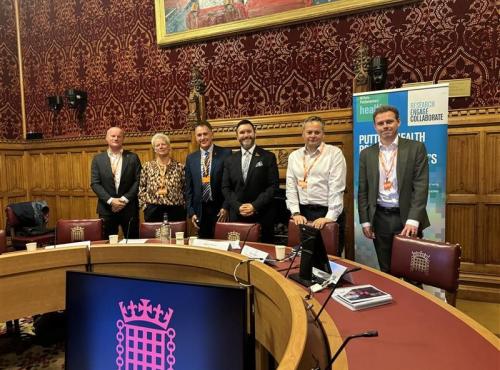How can we use our arts and design expertise and evidence base?
Barry Sheerman MP, chair of the All-Party Parliamentary Design and Innovation Group, chaired this roundtable with speakers:
- Professor Sally Wade - Chair of CHEAD
- Professor Martyn Evans - Director of the Manchester School of Arts
- Professor Chris Speed - Chair of Design Informatics at Edinburgh University
- Ian Thomas - Head of Evidence, Arts at British Council
Yesterday's was the first session in a three-part series with the Council for Higher Education in Art & Design (CHEAD). It explored current issues contributing to the underutilisation of existing Art and Design Research and how we can develop existing case studies flexibly to ensure that wider application of these examples works efficiently and reaps the benefits.
The event brought together expert academics and organisations to advise on how this evidence can be properly developed into policy making decisions involving a discussion from the following questions:
-
How can we best make use of existing examples, e.g. existing REF Impact case studies, to ensure that their findings are translated and appropriately expressed to policymakers? Is the solution to this is embedding a process through which this can occur?
-
What are the ways in which the Art and Design evidence base influence policy making decisions? For instance, it can contribute by functioning as the rationale for funding allocations.
-
What is it exactly that we are trying to achieve for the Art and Design evidence base – what does the ideal future state look like?
All-Party Parliamentary Design and Innovation Group Chair, Barry Sheerman MP, opened the session by setting the scene and agenda for the discussion, introducing the speakers and speaking on his experience and passion for design.
Our first speaker, Professor Sally Wade, Chair of CHEAD, started off her speech by drawing attention to the CHEAD-APDIG partnership on this three-part roundtable series, making note of the importance of the collaborative effort to promote this important discussion. She went on to speak on how we move from research and design to informing policy, bringing attention to the work of CHEAD and three specific case studies and ending on the note that we must work collectively to maximise the impact.
The Director of the Manchester School of Arts, Professor Martyn Evans, spoke on the issue of getting the public more engaged in design and to inform the public of the impact arts and design can have on society. He noted that he wants to continue speaking to the nay-sayers while also targeting the media to underscore the fact that design is a "strategic resource that can have a huge impact."
Our third speaker, Ian Thomas, Head of Evidence - Arts at British Council introduced the work of British Council, drawing attention to their Crafting Futures programme while bringing in examples of how they intend to learn from international case studies. He specifically highlighted how the policy influence in Mexico can put craft and design on the agenda. Ian also made note of what we can learn from our European neighbours and how the UK should move forward.
Our final speaker, Professor Chris Speed, Chair of Design Informatics at Edinburgh University introduced several thought provoking points on data and the world around us, while focusing his speech on the importance of impact and what he wants to see from it.
Following on from the speaker presentations Barry Sheerman MP opened up the floor for a general discussion with input from the audience. Themes covered in the discussion included pathways to a sustainable future, how to engage the local communities, comparisons between design in the UK and other countries such as the Nordics and USA as well as what schools should do to incorporate design in education.
This was the first roundtable in a three-part series on 'Realising Art and Design Research in Policy Making Decisions' together with CHEAD.
The second roundtable, titled Arts and Design Research: Applied to the UK’s Grand Challenges, will take place on December 9.
Follow APDIG on Twitter to keep up with their work.



